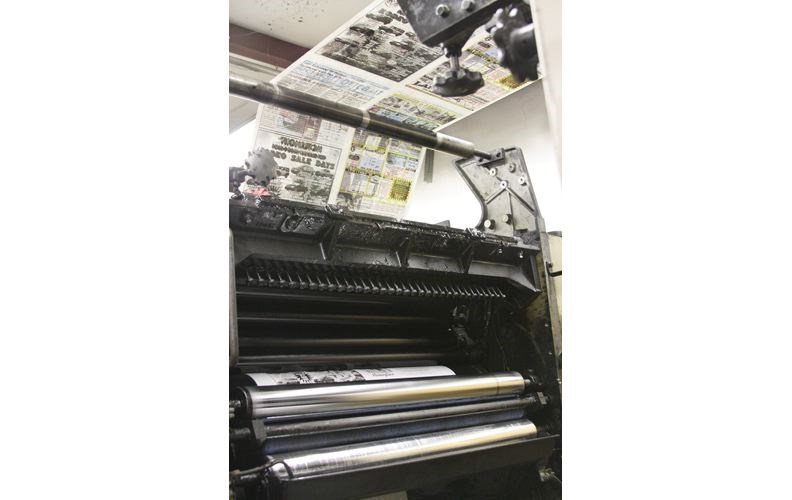There was an interesting and well-attended panel discussion on Wednesday night at the Prince George Public Library to help area non-profit groups market their events and fundraisers with local media outlets.
Moderated by Two Rivers Gallery managing director Carolyn Holmes, the panel was made up of Kelli Moorhead from the Jim Pattison Group (CKPG-TV, 99.3 The Drive and 101.3 The River), Kyle Wightman from Vista Radio (94.3 The Goat and Country 97) and Cheryl Stewart, the director of advertising here at The Citizen.
Holmes pointed out in her opening remarks that there are other Prince George media outlets, including three other radio stations (CBC, CFUR at UNBC and community station CFIS) but the focus was on the mainstream for-profit media. She didn't use the phrase "legacy media" but within the business, that's what longstanding radio, TV and print media are called in an era where so much of the audience has migrated online.
All three of Prince George's legacy media outlets have a significant online presence to reach local audiences with news and advertising, as well as popular social media connections, particularly on Facebook. All three outlets also offer specialized products and services for targeted audiences within their specific fields of expertise. The Citizen, for example, publishes numerous magazines, including the new and improved Citizen Scene quarterly magazine which came out this week to highlight arts and entertainment activity across Prince George.
Whatever the medium, all of us butter our bread on local and community.
Google and Facebook, meanwhile, have robbed legacy media of both audience and revenue but have given individual communities nothing back in return. While people can use Facebook to do good, like last summer's community barbecue for the wildfire evacuees, a group effort by the administrators and followers of Hell Yeah Prince George!, that kind of community engagement is the exception, not the rule, and Facebook as a business had nothing to do with making it happen.
In Prince George, as in every other community in Canada and around the world, Google and Facebook are everywhere and nowhere at once. They surround our lives as individuals but they do shockingly little to bring us together, particularly at the city, town and neighbourhood level. Meanwhile, Prince George's legacy media outlets spend millions of dollars annually, with money and in-kind services, to help non-profits fundraise and put on community events.
As a result, on a chilly February night in Prince George in 2018, concerned residents and non-profit stakeholders met with legacy media representatives about how to spread the word in Prince George about the great, essential community work being done. It was the continuation of a conversation that has been ongoing for the last several years between the legacy media outlets and local businesses. Many of the owners and managers of these businesses are slowly coming to realize that social media marketing and a snazzy website aren't enough to attract and retain local customers.
This is the path to survival for legacy media outlets in Prince George and places like it, while also pointing to the decline or even demise - as hard as that may be to imagine in this era - of Google and/or Facebook.
Unfortunately, the prevailing attitude is that radio, in a time of satellite radio and streaming music, is dead, that network TV, with Netflix and YouTube, is dead, that newspapers and magazines, with online news, are dead.
Yet, if we're all so dead, why are we still so essential to our community and to helping non-profits and small businesses connect with local residents?
These relationships are collaborative, where some or all of the legacy media outlets will jointly sponsor groups or events, but it's also collaborative between the non-profits and local businesses and the individual outlets. Successful marketing through one or all of the legacy media, in whatever way on whatever channel, helps local business prosper and that's good for everyone.
Meanwhile, Google and Facebook only care about these things in the most superficial of ways - they keep all the money and rely on the users to create the community and do all the work. And if that community spews mean-spirited, anti-community garbage, like WTF Prince George, Mark Zuckerberg doesn't care because he still gets paid.
Wednesday night's meeting boiled down to the old-fashioned but always relevant concepts of community and connection. When everyone works together on common goals, everyone benefits. Legacy media outlets care about their communities, their audiences and their customers because it makes sense, for their bottom line, for the bottom line of their clients and for overall community health.
Wednesday's meeting was Prince George at its finest - stakeholders of various local groups getting together to talk about how they could work more closely with one another to help each other thrive and make the community better. That's how this city and its media outlets have been successful in the past and that's the best way to keep moving forward.
-- Editor-in-chief Neil Godbout



